|
|
|
Sort Order |
|
|
|
Items / Page
|
|
|
|
|
|
|
| Srl | Item |
| 1 |
ID:
135346


|
|
|
|
|
| Summary/Abstract |
The author considers the validity of the widespread assumptions that Asia is on the path to unending growth and success and that the 21st century, will be Asia's century. In fact this success is relatively recent and restricted to a handful of countries rather than applying to Asia as a whole. For the future the main determinants of Asia's continuing prosperity will be thorough and far-reaching economic restructuring, improved governance, operating in a way which enables change rather than stifles it and the preservation of that peace and stability in the region which has been the single most important factor in Asia's renaissance hitherto. Continuing US involvement will be required. That said, there are reasonable grounds for confidence in the abilities of Asia and the Asians.
|
|
|
|
|
|
|
|
|
|
|
|
|
|
|
|
| 2 |
ID:
136643
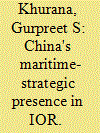

|
|
|
|
|
| Summary/Abstract |
Developments of the past few years clearly indicate China's quest to establish a permanent maritime-strategic presence in the Indian Ocean Region. With China fast emerging as a global super-power with the potential to challenge the primacy of the USA, this is accompanied with significant geopolitical, geoeconomic and security ramifications for the regional countries. This article attempts to examine the possible implications in terms of regional stability, regional balance of power, maritime security, maritime safety, economics and the adversarial potential in India–China relations. For an objective analysis, the study is based on two contrasting theories of international relations. When viewed in context of the Realist theory, China's presence in the region may lead to zero-sum outcomes. On the other hand, the premise of Constructivism could lead to “win-win” outcomes. The paper concludes that the outcomes are likely to lie somewhere between the aforesaid extremes, depending upon the actions of all states that have stakes in the region. It also attempts broadly to suggest the way ahead for all stakeholders in the region.
|
|
|
|
|
|
|
|
|
|
|
|
|
|
|
|
| 3 |
ID:
135006


|
|
|
|
|
| Summary/Abstract |
This article examines the issue of Common Foreign and Security Policy alignment—a procedure by which governments from the European Union's neighbourhood may support previously adopted Common Foreign and Security Policy documents. It provides a comparative theory test of Common Foreign and Security Policy alignment in Georgia, Armenia and Azerbaijan. In doing so it seeks to elucidate why they engage in alignment as well as how cross-country and cross-issue variance can be theorised. After reviewing the explanatory potential of power-based and sociological institutionalist theory, domestic variables are assessed. The essay shows that, contrary to frequently expressed assumptions, convergence is even possible in less institutionalised high politics fields. But it emphasises that it is largely conditioned by domestic institutional configurations, the preferences of individual or collective actors and overall state gains.
|
|
|
|
|
|
|
|
|
|
|
|
|
|
|
|
| 4 |
ID:
135336


|
|
|
|
|
| Summary/Abstract |
This article aims to explore the connection between the new 2013 Foreign Policy Concept of the Russian Federation and Christian messianism in contemporary Russian intellectual thought. The ‘conservative turn’ in Russian politics is associated with the return to the cultural and political ideologeme of Katechon, which is proposed by several right-wing intellectuals as the basis for the Russia's new state ideology and foreign and security policy. The theological concept of Katechon (from the Greek ό Κατέχων, ‘the withholding’) that protects the world from the advent of the Antichrist originates in the Byzantine Empire. In Russian tradition, this concept is presented in the well-known doctrine of Moscow as the Third Rome, dating back to the 16th century. The term ‘Katechon’ in contemporary Russian political discourse is relatively new and can be traced to the post-Soviet reception of Carl Schmitt's political theology. The concept of Russia as Katechon is directly connected to the national security and defence policy, because it is used as the ideological ground for the new wave of militarization and anti-Western sentiment, as well as for Russia's actions during the Ukrainian crisis. This analysis puts the internal political and cultural debate on Russia's role in international affairs and its relations with the West into historical perspective and demonstrates the right-wing intellectual circles’ influence on the Kremlin's new domestic and foreign policy
|
|
|
|
|
|
|
|
|
|
|
|
|
|
|
|
| 5 |
ID:
136872


|
|
|
|
|
| Summary/Abstract |
In this article we seek to address the emerging role of the European Union (EU) as a security and intelligence actor from the perspective of counter-terrorism. Intelligence as a process and product has been strongly promoted by the EU as a useful and necessary tool in the fight against terrorism, radicalization, organized crime and public order problems. A range of agencies has been established that collect, analyze and operationalize intelligence in view of strategically defined security threats. Examples are Europol and Frontex. This article makes an inventory of their roles and competences in the field of intelligence and looks at the list of instruments that encourage the sharing of intelligence between different law enforcement and security agencies. Moreover, it is argued in this article that as intelligence becomes more hybrid and as the EU only holds light powers of oversight on ownership and integrity of data, considerable governance challenges lurk around the corner. As ‘intelligence’ is usually a complex and sensitive product, it often travels outside formal bureaucratic channels, which undermines accountability and transparency of where, how and for what purpose the intelligence was gathered.
|
|
|
|
|
|
|
|
|
|
|
|
|
|
|
|
| 6 |
ID:
135763


|
|
|
|
|
| Summary/Abstract |
Recent efforts to implement gender mainstreaming in the field of security sector reform have resulted in an international policy discourse on gender and security sector reform (GSSR). Critics have challenged GSSR for its focus on ‘adding women’ and its failure to be transformative. This article contests this assessment, demonstrating that GSSR is not only about ‘adding women’, but also, importantly, about ‘gendering men differently’ and has important albeit problematic transformative implications. Drawing on poststructuralist and postcolonial feminist theory, I propose a critical reading of GSSR policy discourse in order to analyse its built-in logics, tensions and implications. I argue that this discourse establishes a powerful ‘grid of intelligibility’ that draws on gendered and racialized dualisms to normalize certain forms of subjectivity while rendering invisible and marginalizing others, and contributing to reproduce certain forms of normativity and hierarchy. Revealing such processes of discursive in/exclusion and marginalized subjectivities can serve as a starting point to challenge and transform GSSR practice and identify sites of contestation.
|
|
|
|
|
|
|
|
|
|
|
|
|
|
|
|
| 7 |
ID:
135692
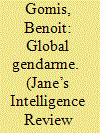

|
|
|
|
|
| Summary/Abstract |
Francois Hollande has proved active on the international stage, intervening militarily and diplomatically on many fronts, Benoit Gomis examines whether persistent internal challenges may force France to become more isolationist in the future.
|
|
|
|
|
|
|
|
|
|
|
|
|
|
|
|
| 8 |
ID:
135751


|
|
|
|
|
| Summary/Abstract |
The northwestern Chinese region of Xinjiang is experiencing ongoing violent unrest but remains an economic gateway to Eurasia. Sarah Lain examines China’s policy to improve security and economic cooperation with its central Asian neighbours.
|
|
|
|
|
|
|
|
|
|
|
|
|
|
|
|
| 9 |
ID:
135296


|
|
|
|
|
| Summary/Abstract |
When Catherine Ashton took up office as High Representative of the Union for Foreign Affairs and Security Policy (HR), she met with high expectations – and much disappointment. As the first incumbent of the remodelled position, she had the chance to leave a legacy for her successor, but faced an unclear job description. What was the HR’s role in EU foreign policy? It is argued that the HR acted as a diplomat and manager of EU external action, while her role performance in co-leadership and brokering were less successful. Role expectations and performance entered a fragile equilibrium at the end of Ashton’s tenure. However, the future role of the HR might shift more towards a co-leader of EU foreign policy.
|
|
|
|
|
|
|
|
|
|
|
|
|
|
|
|
| 10 |
ID:
135939


|
|
|
|
|
| Summary/Abstract |
China's rise and clear ambition to change Asia poses both tactical and strategic questions, long neglected in Japan. Tactically, territorial challenges can be countered effectively by use of Anti-Access Area Denial [A2/AD] tactics, as Japan is now doing. The strategic issues: how to deal with a hostile nuclear super-power neighbor, counter nuclear blackmail, and so forth, are far more difficult. This author believes that US “extended deterrence” no longer exists. Washington in fact would never use nuclear weapons to defend Japan, whatever promises have been made. The only answer, and one that decreases rather than increases the possibility of conflict, is for Japan to acquire within a decade a minimal nuclear deterrent, too small for war-making but adequate to prevent attack, such as those maintained by Britain and France, who know America best. Without such a deterrent Japan will be defenseless against inevitable Chinese nuclear threats and blackmail.
|
|
|
|
|
|
|
|
|
|
|
|
|
|
|
|
| 11 |
ID:
135341
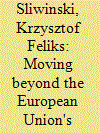

|
|
|
|
|
| Summary/Abstract |
Policy and research on European cyber-security remains formative compared to leaders in the field like China and the United States. This article evaluates the European Union (EU) as a cyber-security actor, asking fundamental questions concerning the EU's combination of prominence and obscurity, especially its limitations and prospects. Who and what is going to dominate the European response to cyber-security in the future? These questions are examined within the larger framework of liberal intergovernmentalism. The EU also is compared to the North Atlantic Treaty Organization (NATO), a point of reference to further understand the limitations and challenges ahead for the EU. Two major factors limit the EU as a cyber-security actor: its intergovernmental character, and the lack of collective vision on cyber-security with the EU and between member states. To play an important role in shaping cyberspace and cyber-security, the EU cannot treat the internet as simply a communication tool or trading platform. Cooperation and capacity-building measures are needed to allow EU member states to surpass mere coordination of their respective national cyber-security strategies. To succeed as a cyber-power, the EU should adapt new and different forms of cyber-power, from the compulsory through the institutional, to the structural and productive. Otherwise, coordination of national strategies for cyber-security of EU member states is the most the EU as an actor can aim for.
|
|
|
|
|
|
|
|
|
|
|
|
|
|
|
|
| 12 |
ID:
134711


|
|
|
|
|
| Summary/Abstract |
Research in private military and security companies has matured over the last fifteen years. This essay reviews past research and identifies three areas needing further attention; progress in these areas is critical for guiding security and defense policies and establishing effective regulations.
|
|
|
|
|
|
|
|
|
|
|
|
|
|
|
|
| 13 |
ID:
135931
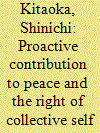

|
|
|
|
|
| Summary/Abstract |
Since the inauguration of the second Abe cabinet in December 2012, there have been many important developments in the area of security policy. This article examines each new policy and how it fits in to the National Security Strategy principles of a “proactive contribution to peace” and international cooperation. It concludes with a comparison of the new policies with those of other major world powers and a discussion of the main source of opposition to Japan's security policy.
|
|
|
|
|
|
|
|
|
|
|
|
|
|
|
|
| 14 |
ID:
136875
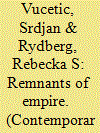

|
|
|
|
|
| Summary/Abstract |
What is left of the ‘empire by invitation’? Coined by Geir Lundestad in 1986, the seemingly contradictory phrase has been used to explain the nature of American power in Western Europe and beyond. This article revisits the concept to shed light on Norway's 2008 decision to recapitalize its fighter jet fleet with the F-35 Joint Strike Fighter – an event of considerable political significance in the ongoing history of this complex, controversial, and geopolitically consequential weapons programme. Using multiple sources, including diplomatic cables released by WikiLeaks, the article traces how Americans and their local brokers intervened in the Norwegian policy process to ensure that the F-35s would go to the Royal Norwegian Air Force. In addition to suggesting that ‘empire by invitation’ remains a fact of international political life, the analysis also shows the importance of legitimation strategies in security policy. This especially applies to the study of international arms deals because interactions between and among politicians, diplomats, bureaucrats, and lobbyists always involve claims and counterclaims about legitimate national interest.
|
|
|
|
|
|
|
|
|
|
|
|
|
|
|
|
| 15 |
ID:
134981


|
|
|
|
|
| Summary/Abstract |
Building on the rationalist literature on sanctions, this article argues that economic and political sanctions are a successful tool of nonproliferation policy, but that selection effects have rendered this success largely hidden. Since the late 1970s—when the United States made the threat of sanctions credible through congressional legislation and began regularly employing sanctions against proliferating states—sanctions have been ineffective in halting ongoing nuclear weapons programs, but they have succeeded in deterring states from starting nuclear weapons programs in the first place and have thus contributed to a decline in the rate of nuclear pursuit. The logic of the argument is simple: rational leaders assess the risk of sanctions before initiating a nuclear weapons program, which produces a selection effect whereby states highly vulnerable to sanctions are deterred from starting nuclear weapons programs in the first place, so long as the threat is credible. Vulnerability is a function of a state's level of economic and security dependence on the United States—states with greater dependence have more to lose from US sanctions and are more likely to be sensitive to US-sponsored norms. The end result of this selection effect is that since the late 1970s, only insulated, inward-looking regimes have pursued nuclear weapons and become the target of imposed sanctions, thus rendering the observed success rate of nonproliferation sanctions low. I find support for the argument based on statistical analysis of a global sample of countries from 1950 to 2000, an original data set of US nonproliferation sanctions episodes, and qualitative analysis of the South Korean and Taiwanese nuclear weapons programs.
|
|
|
|
|
|
|
|
|
|
|
|
|
|
|
|
| 16 |
ID:
134624


|
|
|
|
|
| Summary/Abstract |
Against the backdrop of the international political and economic system’s increasing fragmentation, this article attempts to analyse the geopolitical ambitions of the EU. Currently, the EU strives to become an independent global power. For this purpose, the EU tries to establish greater independence from the US and, to a certain degree, from its Member states. This is closely linked to (a) the emergence of the Euro as a currency competing with the US dollar for the status of the ‘global reserve currency’ and (b) the construction of a common foreign and ‘security’ policy. Taking the German literature on the political economy of the state and on the European Integration, insights from neo-Gramscian International Political Economy, and the ‘scale debate’ in Anglophone geography as point of departure, I analyse the European ensemble of state apparatuses and demonstrate that these ambitions have failed, due to the status quo of a fragmented Europe.
|
|
|
|
|
|
|
|
|
|
|
|
|
|
|
|
| 17 |
ID:
134540


|
|
|
|
|
| Summary/Abstract |
The EU’s response to the Arab Spring is seen as one of its biggest missed opportunities. It has been unable to bring together its different tools of foreign, development and security policy into a strategic joined-up approach. The interconnectedness of the socio-economic and political demands of the popular uprisings across the north of Africa represented a unique opportunity to implement such a joined-up approach. The EU’s ambitious rhetoric and pledges to promote ‘deep democracy’ have not been matched at policy level in the fields of money, market or mobility. Whilst certain member states have sought to overcome the different operating logics of the development, diplomatic and security communities in their regional Arab Partnership programmes, a number of structural and circumstantial factors limit the effectiveness of these attempts, at both the EU and member state level.
|
|
|
|
|
|
|
|
|
|
|
|
|
|
|
|
| 18 |
ID:
135564


|
|
|
|
|
| Summary/Abstract |
The article focuses on the 2014 edition of the Future Land Warfare Report released by Australian Army's Modernisation and Strategic Planning division. Topics discussed include transformation of Australian army for meeting the security environment, how land forces work with non-governmental and governmental agencies can help restrict access to lethal technologies, and how land forces can contribute in the country's future operating environment.
|
|
|
|
|
|
|
|
|
|
|
|
|
|
|
|
|
|
|
|
|